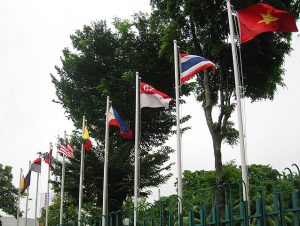A dearth of data and transparency about female genital mutilation in Southeast Asia has stymied efforts to stop it. Global attention and advocacy on the subject have tended to focus on African nations. But now a new pan-Asia network aims to unpack the region’s FGM problem as it works to end the practice.
Around 200 million girls and women are estimated to have been subjected to FGM — the partial or total removal of their external genitalia. But this data on the practice is almost entirely drawn from African countries and doesn’t incorporate most Southeast Asian nations where FGM is also known to take place, including Malaysia, Brunei, Singapore, the Philippines, and southern Thailand.
“People don’t usually think of FGM as something that happens in Asia. It still has an association with Africa,” said Sivananthi Thanenthiran, executive director of the Asian-Pacific Resource and Research Centre for Women (ARROW), a Malaysia-based regional advocacy group. Global meetings tend to be held in countries in Africa, where the practice is concentrated, and funding follows suit.
This premise was challenged in 2016 when Indonesia became the first Asian country to be included in the UN’s global report on FGM prevalence. The “dramatic increase” in the figures “unsettled governments” in Southeast Asia, Sivananthi said, as it showed FGM was more widespread than previously thought. Among the findings was the startling figure that nearly half of Indonesian girls aged 11 and under had undergone FGM.
In recent years victims of botched FGM procedures have spoken out in Singapore, while concerns have been voiced about the unregulated nature of the practice in southern Thailand. In Malaysia, a 2012 study found that more than 93 percent of Muslim women surveyed had undergone FGM.
To strengthen advocacy in the region, ARROW, in June, launched the Asia Network to End FGM/C in partnership with British charity the Orchid Project (FGC, female genital cutting, is a term some people use instead of FGM for reasons explored here). The network seeks to build collaboration between groups already campaigning to end FGM – focusing advocacy work on communities, religious leaders and governments to help eradicate the practice. It is also hoping to address the Asia data gap. Better evidence about the practice’s prevalence, especially governmental reporting, could go a long way to inform Asian advocacy on FGM.
Within Southeast Asia Indonesia has been the most pro-active in challenging FGM — a movement led by women’s rights groups but also at times by the state. In 2006, the government banned the practice (as many countries have, including at least 25 in Africa). But four years later it succumbed to pressure from religious groups, issuing a regulation allowing FGM if performed by medical staff.
The law has been “ambiguous” ever since, said Nina Nurmila, a gender and Islamic studies professor who also sits on Indonesia’s National Commission on Violence Against Women. She thinks FGM ought to be banned alongside a widespread public education campaign about the health risks. But the official advice now just refers Indonesians to an Islamic health council to provide FGM guidelines, effectively putting no bars on the practice. The country’s women’s minister announced a renewed campaign to end FGM in 2016, but opposition from religious leaders has only increased amid growing Islamic conservatism.
Yet the Quran makes no mention of FGM. Leading Islamic scholars worldwide have said there is no basis for the practice, which predates the rise of both Islam and Christianity. And FGM is not practiced in many Islamic societies while it is undertaken by some non-Islamic groups including Christians and Ethiopian Jews. But in Southeast Asia many Muslims believe the practice is compulsory.
In Malaysia, it didn’t help that in 2009 the National Council of Islamic Religious Affairs issued a fatwa that ruled FGM obligatory for Muslims. Unfortunately, there is almost no political will to correct the powerful religious lobby. Last year Malaysia’s Deputy Prime Minister Wan Azizah Wan Ismail, who is also a medical doctor, said FGM was a part of Malaysian culture – despite international consensus that cultural arguments cannot be used to condone violence against people. FGM has no health benefits and procedures can cause severe bleeding and problems including infections and childbirth complications.
The job of reframing the archaic practice as a humans rights issue rooted in extreme discrimination rather than a religious one has been left mostly to activists. The added problem in Malaysia is that FGM has been “normalized” by being offered as a routine medical procedure, said Azrul Mohd Khalib, head of the Galen Centre for Health and Social Policy, a Kuala Lumpur-based think-tank.
As in Indonesia, procedures are even offered as part of “birthing packages” in some hospitals, which further serves to legitimize them. In both countries FGM tends to be conducted at infancy, which activists say makes it a more “hidden” practice. Many women will not remember the trauma they underwent – unlike in countries where FGM is performed when a girl reaches adolescence in a more ceremonial and public manner that she can likely recount.
“For some reason the image is that FGC is not as traumatic as in Africa and is harmless,” Azrul said. “I completely disagree. An invasive procedure is an invasive procedure. You’re basically mutilating a child. And there is no religious justification.”
The new Asia network has started consulting activists around the region on how to move forwards. One strategy showing promise in Indonesia, said Risya Kori, a UNFPA gender specialist in Jakarta, is targeting young Muslims more receptive to change. The country’s growing female ulama (Islamic scholars) movement has also been a positive catalyst with more voices denouncing FGM, she said.
There are communities across Africa that are questioning and even abandoning FGM as a result of longstanding activism and the political will to enforce change. The hope is that Southeast Asian nations will soon do the same.































